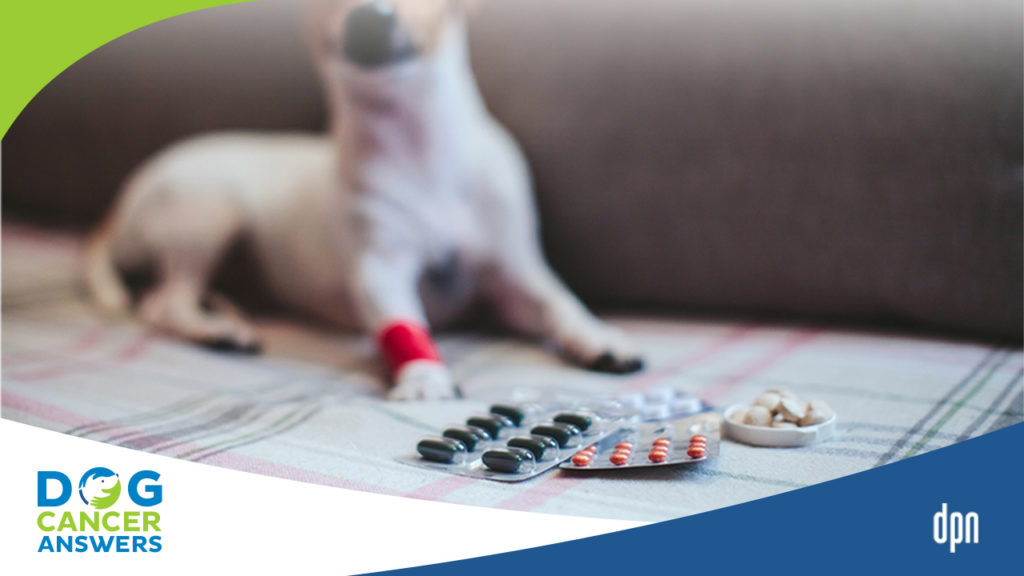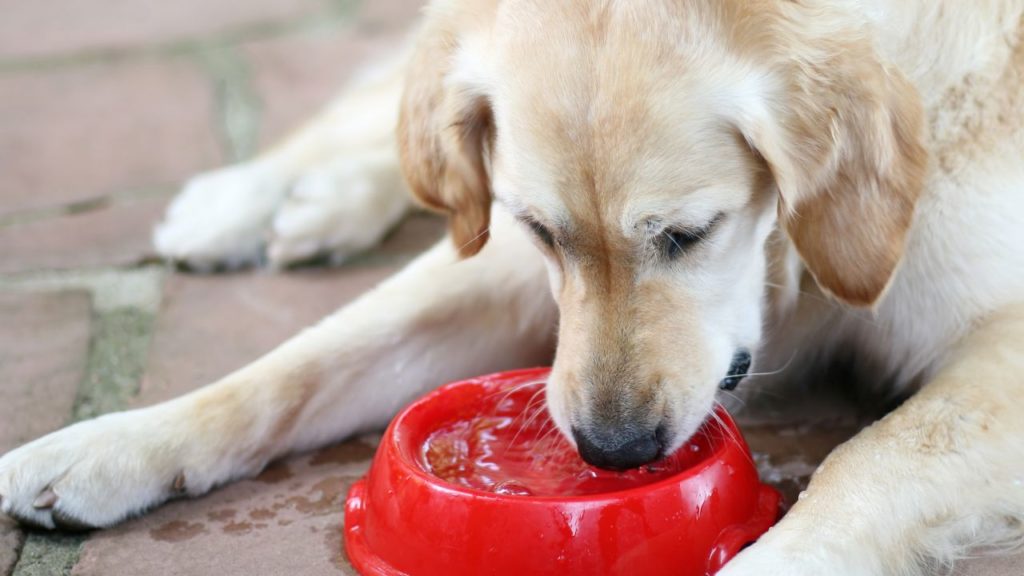Can you get a refund on unused medications? Can you donate them, or use them with another dog? Should you flush unused pharmaceuticals, or throw them in the garbage? If you have leftover or expired dog medications, here’s what to do.
Key Takeaways
- The best way to discard unwanted dog meds is to drop unused or expired medication off at a community drug takeback program.
- Veterinarians may be willing to take back your dog’s medication, but local and federal laws may prohibit them from doing so, depending upon the prescription.
- Flushing medication, particularly chemo pills, down the toilet can contaminate water supplies and harm wildlife.
- If a drug takeback program is not available, the FDA has a list of flushable medications safe to flush.
- Many communities have resources for properly disposing of leftover medications, such as the National Prescription Drug Take Back Day sponsored by the DEA.
First Rule: Don’t Flush!
Historically, the answer to what to do with leftover dog medication was easy: flush it down the toilet. Today, we know better. This is no longer the ideal practice.
Medications that are flushed down the toilet can eventually end up in our water system, contaminating food and water supplies and potentially harming wildlife.2 Antibiotic residues can contribute to growing issues with antibiotic resistance.2
While the amount of any given medication that gets into the water system is small, those small quantities can add up over time. Oral chemotherapy drugs are particularly dangerous. Because of these risks, dropping unused or expired medications off at a community drug takeback program is a better option whenever possible.
That said, there are situations when flushing a medication is okay. The United States Food and Drug Administration (FDA) has a list of flushable medications.1 These drugs have been shown to have minimal impact on the environment in current studies and are also high risk for drug abuse or harm due to accidental exposure if left around the home.1 If a drug takeback program is not readily accessible, the FDA believes that it is safer to flush these medications than to hold on to them long-term.
Dr. Nancy Reese explains why keeping drugs out of our environment is so important in this episode of DOG CANCER ANSWERS.
Community Resources
Many communities have resources for people to discard leftover medications. Some are available year-round, while others are special scheduled events. These events and resources are usually free and no-muss-no-fuss: simply drop off the unneeded medications, no questions asked, and the authorities will dispose of them properly.
The United States Drug Enforcement Agency (DEA) sponsors National Prescription Drug Take Back Day each year. Their website also has listings of locations where you can drop off old medications year-round.3
If you do not see a listing for your area, contact local authorities such as county officials, your police station, or your town clerk to ask about locations and dates for prescription drug disposal. Pharmacies may also be able to take and dispose of these medications or may have a mail-in option.
Before arriving at a drug takeback event, check the list for that location to make sure that they accept your medications. Some medications, such as inhalers and chemotherapy drugs, require special handling and disposal.2 Any needles or syringes should be inside a puncture-proof container.
Veterinary Disposal
Your veterinarian may be willing to take back your dog’s meds to discard them properly. Veterinary facilities already have procedures in place for handling medical waste, and often have relationships with disposal companies that can incinerate potentially dangerous medications safely.
Chemotherapy drugs require special handling, so contact your veterinarian ahead of time to see if they can dispose of those drugs for you.
Most veterinary hospitals do not take returned medications for a refund. This is because of both legal and health concerns.
Once a medication has left the hospital, the veterinarian cannot guarantee that it has been stored and handled properly.
Improper storage could make a medication not work as well, and medications can also be tampered with or contaminated.
It is illegal for vets to resell or even re-dispense medications that have left the hospital and been returned.
In some cases, refunds may be offered for products still sealed in their original packaging.
Disposal at Home
What if your vet isn’t an option, or you don’t have access to a drug takeback program in your area? What to do with leftover dog medications if the “ideal situation” isn’t available?
Try one of these options:
- Check the FDA flush list to see if the medication can be flushed.1
- Contact your garbage service and ask if they have a waste-to-energy facility that can safely incinerate medications. If this is the case, you may be able to dispose of medications in the trash.2
- Mix pills and liquid medications with something unappetizing such as coffee grounds, dirt, cat litter, or vinegar (this can dissolve tablets) and put in a sealed container before discarding.4
- Scratch or blot out personal information on medication packaging and dispose of it separately2 (don’t forget to recycle if you can!).
Can I Give Leftover Meds to My Other Dog?
Always check with your veterinarian before giving your dog medications that were prescribed for another pet (or human). This is important for two reasons:
Different beings often require different dosages and may have unique health concerns. For example, a pain medication prescribed for a dog with bone cancer could cause devastating and permanent liver damage if given to a dog in the early stages of liver disease. Your veterinarian can tell you if the medication is safe for your dog and compatible with any other medications that she may be on.
Giving a medication without obtaining a diagnosis first can complicate and even delay diagnosis and treatment.
Dogs can’t tell us what is wrong, so if you give your dog pain medications before your vet has a chance to examine her, it may be more difficult for the vet to find the injury and evaluate its severity.
If you gave your dog an NSAID but she really needs to be on a steroid, your dog will have to go through a “washout” period of several days with no medications before she can be switched onto the steroid safely.
While seeing your dog in discomfort can be heartbreaking, staying strong for one night until you can get a vet appointment may put your dog in a better spot in the long run.
Bottom line: If you have meds on hand that you think might help your dog, give your vet a call first to double-check the dosage and make sure that it is safe to give that medication.
Can I Use Leftover Dog Meds with My Cat?
Never give your cat a medication intended for a dog unless explicitly told to do so by your veterinarian. Cats have a unique metabolism, and many drugs that are safe for humans and/or dogs are extremely toxic to cats.
Can I Donate Leftover Medications?
Many dog lovers trying to figure out what to do with leftover dog medications assume they can donate them to needy dogs. Unfortunately, this might not be the case.
Veterinarians in most areas cannot legally re-dispense medications that an owner donates back to the hospital, even to a shelter or rescue organization. Once a medication leaves the hospital, the veterinarian can no longer guarantee that it has been stored properly and has not been tampered with.
Some shelters and rescue facilities may be able to accept donated medications but check with them first. Please don’t be offended if they turn down your offer – it is nothing personal. The staff are just trying to do what is best for the animals in their care and follow proper legal procedures you may not be aware of.
Can I Still Use Expired Meds?
From a legal standpoint, expired medications should be discarded. That said, it may be safe to use some expired medications in some cases (see below), so always check with your veterinarian before giving an expired medication.
Most medications are still “safe” after their expiration date and won’t cause harm, but they may not work as well. If a medication is critical for your dog’s health and well-being, you do not want to gamble with efficacy. Different formulations can have different shelf-lives, with some remaining stable for years while others break down in a matter of weeks.
In some cases, an expired medication can be harmful to your dog. Drugs can break down into different compounds or can be contaminated with bacteria over time (particularly liquids and gels).
If you are considering giving your dog an expired medication, talk it over with your veterinarian first so that you understand the potential risks. While some expired medications are more of a risk than others, giving an expired medication is always a gamble to one degree or another.
Dr. Lauren Trepanier discusses the proven link between carcinogens in our environment and dog cancer in this episode of DOG CANCER ANSWERS.
Topics
Did You Find This Helpful? Share It with Your Pack!
Use the buttons to share what you learned on social media, download a PDF, print this out, or email it to your veterinarian.









